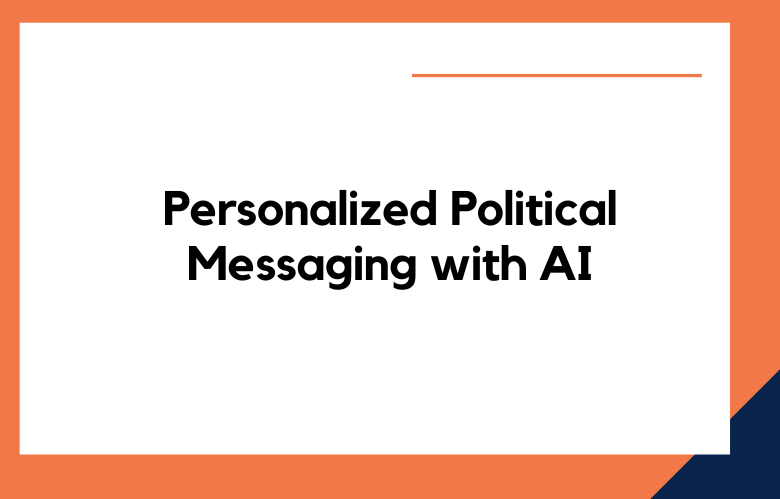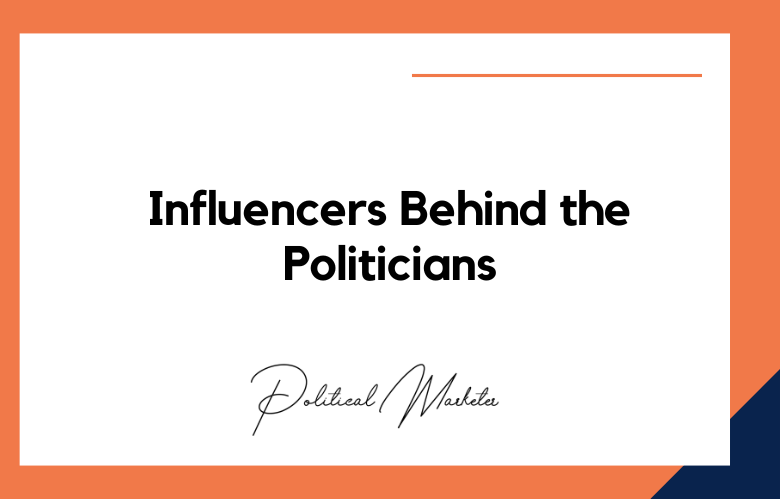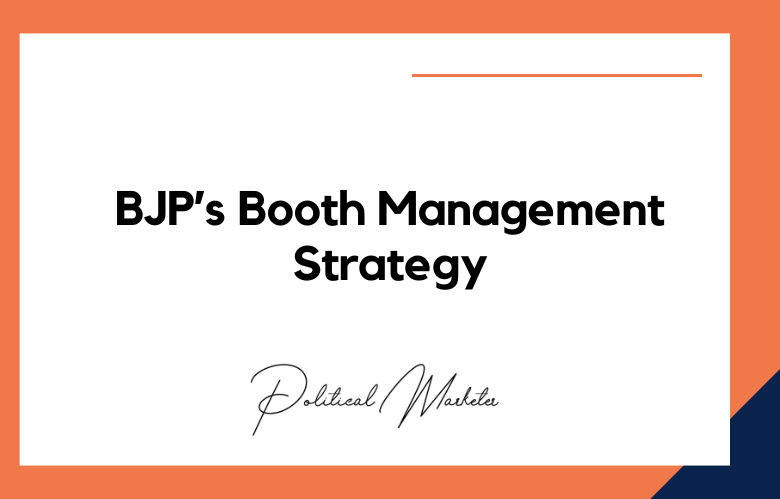The world of politics is constantly evolving, adapting to new technologies, and finding ways to leverage them for a more significant impact. The latest of these technologies is artificial intelligence (AI), which offers unprecedented possibilities for personalized political messaging.
With AI, political campaigns can create and deliver messages tailored to individual voters based on their demographics, interests, and past political behavior. We will explore the benefits and challenges of personalized political messaging with AI and its potential impact on contemporary campaigns.
AI and Personalization
People want to hear what is relevant to them, and making them feel seen and heard is a powerful tool for political campaigns. Personalized political messaging with AI aims to create resonance using data analytics, machine learning, and natural language processing to develop unique content for specific target groups.
AI can analyze various data sources, such as social media activity, demographics, geographic location, and past voting patterns, to deliver relevant messages that truly speak to each voter. This way, campaigns can connect with voters more profoundly, increasing engagement and, ultimately, driving higher poll turnout.
Better Campaign Strategies
Using AI to personalize political messaging can also lead to more effective campaign strategies. By capturing data in real-time, campaigns can adjust their messaging and outreach efforts based on how people engage with their content and how this translates into voting behavior.
This means campaigns can quickly pivot their resources, reduce waste, and optimize communication channels for the best possible exposure to swing voters. Political messaging with AI can take the guesswork out of campaign strategy and provide candidates with invaluable insight into how they can improve their chances of election success.
The Risk of Disinformation
Despite the many benefits of personalized political messaging with AI, significant risks must be addressed. One of these risks is the potential for disinformation. By tapping into people’s data and pre-existing attitudes, AI can create messages that manipulate rather than inform voters.
This is a genuine concern, given the recent rise of fake news and the potential for deepfakes to be used in political advertising. Protecting the integrity of the democratic process requires vigilance and regulation to ensure that political messaging with AI is not weaponized against vulnerable populations.
The Role of Ethical AI in Politics
Given these challenges, it is essential for political campaigns using AI to be guided by ethical principles. The EU has laid down some guidelines on how AI can be used ethically, which include transparency, explainability, and fairness. Focusing on transparency means campaigns should be open about how they use AI and what data they collect from citizens.
The principle of explainability means they should be able to explain how AI arrived at certain decisions or recommendations. Focusing on fairness means they should ensure that AI does not discriminate against specific groups or create unintended biases. Ethical AI in politics can help restore public trust in political campaigns and ensure technology is used appropriately and for the common good.
The Future of Political Campaigning with AI
Personalized political messaging with AI represents a significant milestone in the evolution of political campaigns that could revolutionize the industry. While challenges need to be addressed, the benefits of AI for political campaigning cannot be overstated.
By using AI to personalize messages, campaigns can create a more profound connection with voters, build better campaign strategies, and, ultimately, drive higher turnout. Personalized political messaging with AI can also help to restore public trust in campaigns, as long as ethical principles are adhered to. The future of politics is personalized political messaging with AI, and the sooner we embrace this technology, the more impactful our campaigns will be.
Mind Over Politics: Leveraging AI for Personalized Political Messaging
Politics has always been a sensitive and complex issue. With the advent of technology, it has become easier to disseminate political messages to a broader audience. However, the challenge remains to engage individuals individually and deliver personalized content aligned with their beliefs and interests.
This is where Artificial Intelligence (AI) comes in. AI can be harnessed as a technology designed to learn, adapt, and make decisions based on data to create personalized political messages that resonate with individuals on a deeper level. AI algorithms can comprehensively profile an individual’s interests and beliefs by analyzing multiple data points like browsing history, location, and demographic information.
AI-Powered Politics: The Era of Personalized Messaging Begins
The rise of Artificial Intelligence (AI) technology is rapidly shaping the way that campaigns and politicians communicate with potential voters. With natural language processing, machine learning, and significant data analytics advancements, political messaging can be highly personalized and micro-targeted to individual voters based on their interests, demographics, and browsing history. This approach to political communication is known as AI-powered politics.
AI-powered politics is gaining popularity among candidates seeking an edge in a competitive political climate. By using AI technology to analyze vast amounts of data, political campaigns can identify and engage with specific groups of voters based on their interests and attitudes.
This approach allows political messaging to be customized and delivered directly to individuals more effectively and efficiently, increasing the chances of engagement and, ultimately, votes.
The Power of One: How AI is Revolutionizing Personalized Political Messaging
Political campaigning has come a long way in recent years with the advent of advanced technologies. Artificial Intelligence (AI) has emerged as a game-changer, redefining how political messaging is personalized and delivered to voters. AI is being leveraged to gain deep insights in real-time about individuals’ personalities, interests, beliefs, and other critical traits that enable political parties to create highly tailored messages.
One of the most significant advantages of AI-powered personalized political messaging is that it helps parties understand voters’ behaviors better. They can analyze the data to identify what types of messaging work best for individuals based on their demographic information, political leanings, past voting history, and social media profiles. This allows highly targeted and efficient campaigns to influence voters to shift their allegiance to a particular party or candidate.
Democratizing Political Communication: AI-Enabled Personalized Messaging Takes Center Stage
As political communication continues evolving with new technologies and platforms, democratizing political communication has become increasingly relevant. One approach to achieving this goal is using AI-enabled personalized messaging.
Personalized messaging involves creating targeted content tailored to each recipient’s needs and preferences. By utilizing AI, customized messaging can be highly efficient and effective, as the technology can analyze vast amounts of data to determine the most effective content and delivery methods for each individual.
From Masses to Individuals: Unleashing AI for Personalized Political Messaging
Artificial Intelligence (AI) has become a game-changer in every industry and aspect of life. One particular area where AI is being put to excellent use is personalized political messaging. Gone are the days when politicians broadcast bland, generic messages to large crowds. With AI, politicians can tailor messages to individual voters, creating a personal connection and driving meaningful engagement.
Mass communication has always been a blunt instrument in politics. But now, with AI-powered tools, politicians can craft precise messages tailored to each voter based on their preferences, demographics, behavior, and interests. This can create a more nuanced and relevant conversation between politicians and voters.
Targeted Truths: Exploring the Potential of AI in Personalized Political Messaging
In recent years, personalized political messaging has become a prevalent strategy political campaigns utilize to influence voters. With the advent of artificial intelligence (AI), there has been an increased interest in the potential of this technology to enhance the effectiveness of personalized political messaging.
AI can provide a more accurate understanding of voter behavior and preferences, enabling political campaigns to tailor their messages to specific demographics and individuals.
One of the ways AI can be utilized in personalized political messaging is by analyzing voter data. By leveraging data analytics tools, AI algorithms can parse massive amounts of data to identify voter behaviors and patterns.
These patterns can be used to construct targeted messages that resonate with specific voter groups. For example, AI tools can determine which issues are more important to particular voter demographics and craft messages that address those issues.
Conclusion:
Personalized political messaging with AI is the future of political campaigning. Using advanced technologies such as machine learning and natural language processing, political campaigns can personalize their messaging, reach the right target groups, and boost election success.
While there are concerns about the risk of disinformation, ethical principles such as transparency, explainability, and fairness will help to mitigate these risks. The future of political campaigns is all about creating a personal connection with voters, and personalized political messaging with AI is poised to deliver that connection on an unprecedented scale.
Call: +91 9848321284
Email: [email protected]
Personalized Political Messaging with AI: FAQs
What Is Personalized Political Messaging With AI?
It is the use of artificial intelligence, such as machine learning and natural language processing, to craft and deliver messages tailored to each voter’s demographics, interests, and behavior.
How Does AI Help Create Personalized Messages?
AI analyzes data like social media activity, location, demographics, and voting history to generate content that aligns with a voter’s specific concerns and values.
What Data Sources Do Campaigns Use For AI Personalization?
Campaigns often use social media behavior, demographic data, geographic location, and past political engagement to create detailed voter profiles.
Why Are Personalized Political Messages More Effective?
They feel more relevant and relatable to individual voters, which increases engagement, improves trust, and can positively influence voter turnout.
How Does AI Improve Campaign Strategy In Real Time?
AI enables campaigns to adjust messaging strategies on the fly by processing real-time data and identifying what content performs best across voter groups.
What Role Do Machine Learning And NLP Play?
Machine learning identifies voter segments and behavioral trends, while natural language processing creates or tailors messages to suit those segments.
Can AI Personalization Increase Voter Engagement?
Yes. Tailored messages that speak directly to voter needs and beliefs tend to generate higher levels of interest, emotional connection, and participation.
What Are The Ethical Concerns With AI-Powered Messaging?
There are concerns about voter manipulation, loss of privacy, targeting vulnerable populations, and the use of disinformation.
What Is The Risk Of Disinformation With AI Messaging?
AI systems can scale false or misleading content quickly, especially when trained or prompted to exploit voter biases.
Why Is Ethical AI Important In Political Campaigns?
Ethical AI helps maintain fairness, transparency, and accountability while reducing the risk of discrimination or voter manipulation.
What Ethical Principles Should Guide AI Messaging?
Core principles include transparency, explainability, fairness, data privacy, and protection from misuse or bias.
How Can Campaigns Ensure Fairness In AI Personalization?
Campaigns should audit AI systems, monitor for bias, and ensure equitable treatment across all demographic and voter groups.
What Regulations Exist Around AI Political Messaging?
Some regions are introducing laws that require transparency in AI-generated content, disclosure of automated targeting, and stronger data privacy enforcement.
Can Personalized Messaging Restore Voter Trust?
When done ethically and transparently, personalized messaging can help voters feel seen and understood, improving trust in the political process.
How Does Transparency Build Trust In AI Messaging?
Disclosing how data is collected and used, what personalization involves, and allowing voters control over their data fosters confidence.
Is AI-Led Political Personalization The Future Of Campaigning?
Yes. AI is expected to become central to campaign operations, offering scalable, data-driven ways to engage voters more meaningfully.
How Do AI Tools Enable Democratization Of Campaigns?
AI lowers the barrier for smaller campaigns to use sophisticated targeting and messaging techniques that were once exclusive to large operations.
How Can Campaigns Guard Against AI-Driven Manipulation?
By setting internal ethical standards, monitoring message accuracy, reviewing AI outputs, and maintaining content oversight.
Can AI Personalization Influence Swing Voters?
Yes. AI helps identify undecided voters and shape messages that speak directly to their values, concerns, and past behaviors.
Should There Be Limits On AI Use In Political Messaging?
Many experts argue for regulatory safeguards to prevent manipulation, ensure voter privacy, and preserve the integrity of democratic processes.











